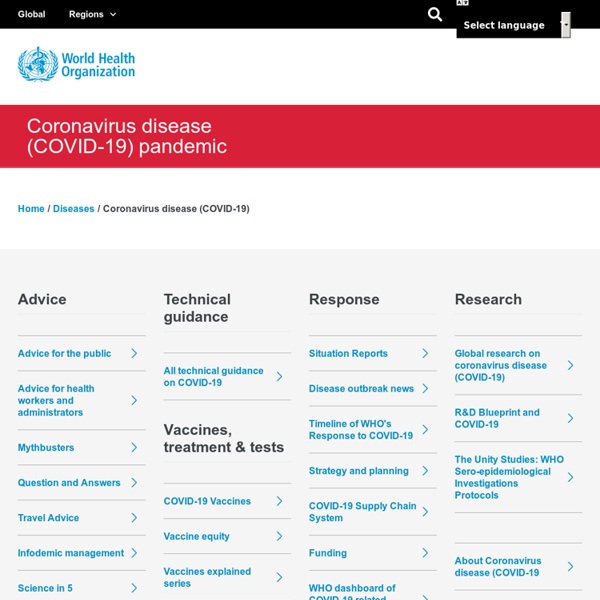



https://www.who.int/emergencies/diseases/novel-coronavirus-2019
Related: COVID-19 • COVID-19 Resources • Covid-19 • Emp & Careers • COVID-19 : RessourcesJohn Hopkins COVID Coronaviruses are a family of RNA viruses that typically cause mild respiratory disease in humans. A novel coronavirus (COVID-19) was identified in Wuhan, China in December 2019. Our experts are closely following and analyzing updates on this outbreak. The following resources will be routinely updated. COVID-19 Update; 3/14/2020. A Message From Concerned Physicians – Michael Leavitt Why are we writing this? The COVID-19 pandemic has reached a point where containment is no longer possible. The COVID-19 threat is real, and rapidly getting worse. Many of you are very nervous, some are unsure of the validity of the information you are reading.
Q&A on coronaviruses (COVID-19) Currently, there is not enough evidence for or against the use of masks (medical or other) in healthy individuals in the wider community. However, WHO is actively studying the rapidly evolving science on masks and continuously updates its guidance. Medical masks are recommended primarily in health care settings, but can be considered in other circumstances (see below). The economic consequences of Covid-19 Covid-19 will have major economic consequences for Europe, but how large will the costs prove to be? Iain Begg outlines the difficult economic choices the outbreak poses for policymakers and analyses the long-term effects the economic downturn is likely to have. Rapidly rising unemployment rates and warnings from many businesses about their viability testify to the looming economic threats from the Covid-19 health crisis. A sharp recession is already underway and could see a double-digit percentage decline in global GDP in the next quarter, with no real sense of when it will end or how a recovery can be achieved.
Centre d'informations de l'éditeur Elsevier sur le Covid-19 (en anglais) By Margaret Trexler Hessen, MD, Director, Point of Care, Elsevier | Updated March 2, 2020 Novel coronaviruses have emerged as human pathogens in the past, notably associated with outbreaks of SARS (severe acute respiratory syndrome) and MERS (Middle East respiratory syndrome). Current investigative methods and recommendations derive in some part from the experience of those epidemics. Diagnosis: Although respiratory infections (including influenza) are prevalent in the northern hemisphere during the winter, clinicians should inquire about travel history and exposure to possible or known COVID-19 in persons presenting with respiratory illness. The possibility of COVID-19 should be suspected in persons who present with compatible clinical illness and exposure history. The US Centers for Disease Control (CDC) and World Health Organization (WHO) developed criteria for whom to test, and these have been modified continually.
China CDC Weekly National Health Commission Update March 29, 2020 Confirmed cases: 45 new, 81,439 total. Suspected cases: 28 new, 174 total. coronavirus-myths As the novel coronavirus continues to infect people around the world, news articles and social media posts about the outbreak continue to spread online. Unfortunately, this relentless flood of information can make it difficult to separate fact from fiction — and during a viral outbreak, rumors and misinformation can be dangerous. Here at Live Science, we've compiled a list of the most pervasive myths about the novel coronavirus SARS-CoV-2 and COVID-19, the disease it causes, and explained why these rumors are misleading, or just plain wrong. Myth: Face masks can protect you from the virus Your biggest questions about coronavirus, answered The coronavirus pandemic has only just begun. Everyone is trying to wrap their heads around what they need to know to protect themselves and their communities, and prepare for what’s next. Here are answers to some of the biggest questions our readers have about the outbreak, which we collected in a survey sent out through social media and other avenues. This post will stay live with more questions added to it (and, hopefully, some answers) as the outbreak progresses.
Effects of recession on the graduate labour market Navigating the job market is inevitably tricky during a recession, but evidence from the last decade reveals that the experience of graduates is very different to that of non-graduates It was widely reported that the outlook for graduates during the 2008/09 recession was bleak. Many graduates were so disheartened by the state of the labour market and media commentary that they gave up hope of finding employment altogether and even stopped looking for jobs.1 Graduate recruitment campaigns shrank: vacancies fell by 8.9% in 20092 two-thirds of employers implemented a recruitment freeze3. JAMA COVID19 [Skip to Content] [Skip to Content Landing] Coronavirus (COVID19) Check here for the latest on COVID-19 diagnosis and treatment Add to My Interests All
State Links to Coronavirus (COVID-19) Information/Data Portals/Resource Centers From State Governments and District of Columbia Filed by Gary Price on March 8, 2020 Below find a spreadsheet containing a list of DIRECT links to the Coronavirus (COVID-19) pages/portals/resource centers/etc. from each state government and the District of Columbia. A PDF version is available here.